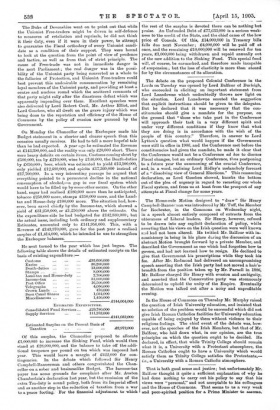On Monday the Chancellor of the Exchequer made his Budget
statement in a shorter and clearer speech than this occasion usually receives. He had to tell a more hopeful tale than he had expected. A year ago he estimated the Revenue at £143,390,000, and the reality was only £20,000 short. There were heavy deficits on certain items, Customs coming short by £500,000, tea by £210,000, wine by £146,000, the Death-duties by 2650,000 ; beer, which was estimated to yield £13,100,000, only yielded £12,680,000, and spirits £17,360,000 instead of £17,700,000. In a very interesting passage lie argued that everything pointed to a permanent decline in the national consumption of alcohol,—a gap in our fiscal system which would have to be filled up by some other means. On the other hand, sugar had realised £180,000 more than he anticipated, tobacco £250,000 more, stamps £150,000 more, and the Land- tax and House-duty £100,000 more. The situation had, how- ever, been saved chiefly by the Income-tax, which showed a yield of £31,250,000, or £1,250,000 above the estimate. On the expenditure side he had budgeted for £142,880,000; but the actual issue, including both ordinary and supplementary Estimates, amounted only to £141,956,000. This, with a Revenue of £143,370,000, gave for the past year a realised surplus of £1,414,000, which ho intended to use to strengthen the Exchequer balances.










































 Previous page
Previous page